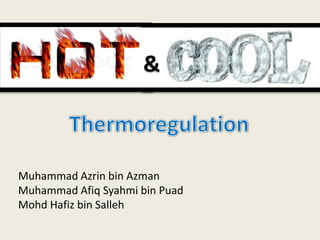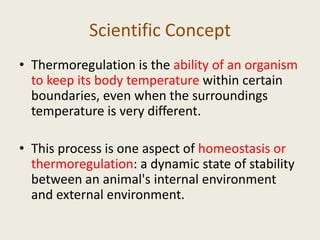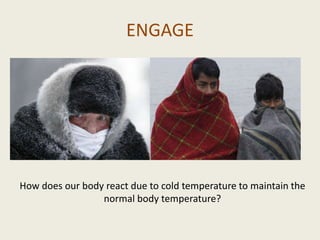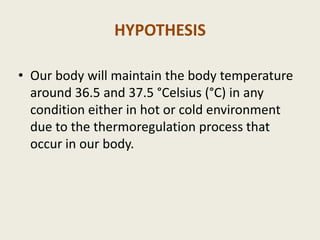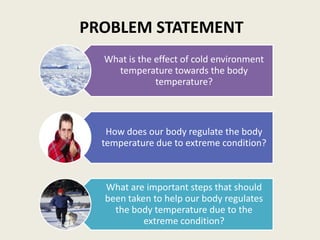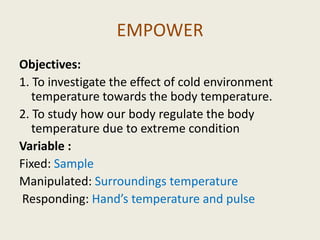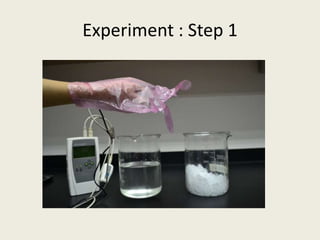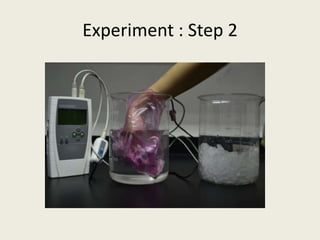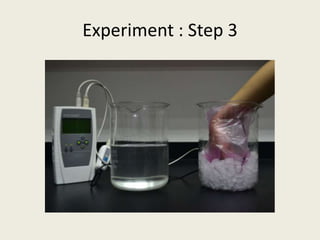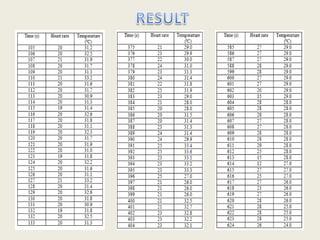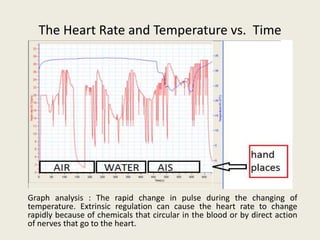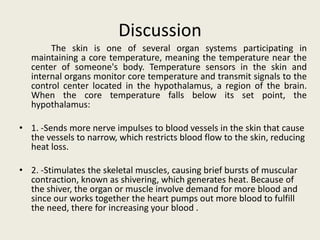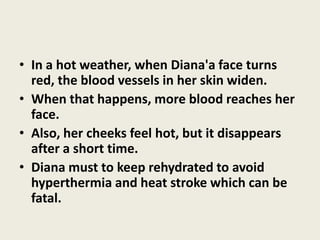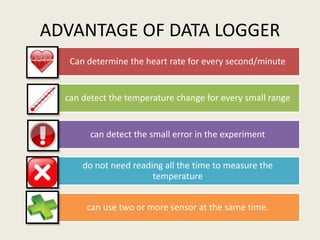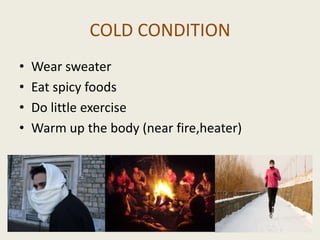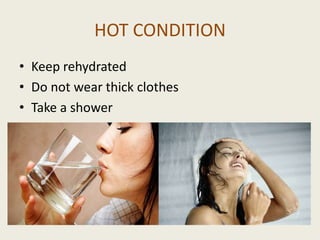Data logging : Thermoregulation
- 1. Muhammad Azrin bin Azman Muhammad Afiq Syahmi bin Puad Mohd Hafiz bin Salleh
- 2. Scientific Concept • Thermoregulation is the ability of an organism to keep its body temperature within certain boundaries, even when the surroundings temperature is very different. • This process is one aspect of homeostasis or thermoregulation: a dynamic state of stability between an animal's internal environment and external environment.
- 3. ENGAGE How does our body react due to cold temperature to maintain the normal body temperature?
- 4. HYPOTHESIS • Our body will maintain the body temperature around 36.5 and 37.5 °Celsius (°C) in any condition either in hot or cold environment due to the thermoregulation process that occur in our body.
- 5. PROBLEM STATEMENT What is the effect of cold environment temperature towards the body temperature? How does our body regulate the body temperature due to extreme condition? What are important steps that should been taken to help our body regulates the body temperature due to the extreme condition?
- 6. EMPOWER Objectives: 1. To investigate the effect of cold environment temperature towards the body temperature. 2. To study how our body regulate the body temperature due to extreme condition Variable : Fixed: Sample Manipulated: Surroundings temperature Responding: Hand’s temperature and pulse
- 7. Experiment : Step 1
- 8. Experiment : Step 2
- 9. Experiment : Step 3
- 11. The Heart Rate and Temperature vs. Time Graph analysis : The rapid change in pulse during the changing of temperature. Extrinsic regulation can cause the heart rate to change rapidly because of chemicals that circular in the blood or by direct action of nerves that go to the heart.
- 12. Discussion The skin is one of several organ systems participating in maintaining a core temperature, meaning the temperature near the center of someone's body. Temperature sensors in the skin and internal organs monitor core temperature and transmit signals to the control center located in the hypothalamus, a region of the brain. When the core temperature falls below its set point, the hypothalamus: • 1. -Sends more nerve impulses to blood vessels in the skin that cause the vessels to narrow, which restricts blood flow to the skin, reducing heat loss. • 2. -Stimulates the skeletal muscles, causing brief bursts of muscular contraction, known as shivering, which generates heat. Because of the shiver, the organ or muscle involve demand for more blood and since our works together the heart pumps out more blood to fulfill the need, there for increasing your blood .
- 13. ENHANCE In a sunny day, Diana is waiting for a bus to go to the library. Her fair skin become redness as long as she is waiting there. Why this situation happened?
- 14. • In a hot weather, when Diana'a face turns red, the blood vessels in her skin widen. • When that happens, more blood reaches her face. • Also, her cheeks feel hot, but it disappears after a short time. • Diana must to keep rehydrated to avoid hyperthermia and heat stroke which can be fatal.
- 15. ADVANTAGE OF DATA LOGGER Can determine the heart rate for every second/minute can detect the temperature change for every small range can detect the small error in the experiment do not need reading all the time to measure the temperature can use two or more sensor at the same time.
- 16. AWARNESS
- 17. COLD CONDITION • Wear sweater • Eat spicy foods • Do little exercise • Warm up the body (near fire,heater)
- 18. HOT CONDITION • Keep rehydrated • Do not wear thick clothes • Take a shower

